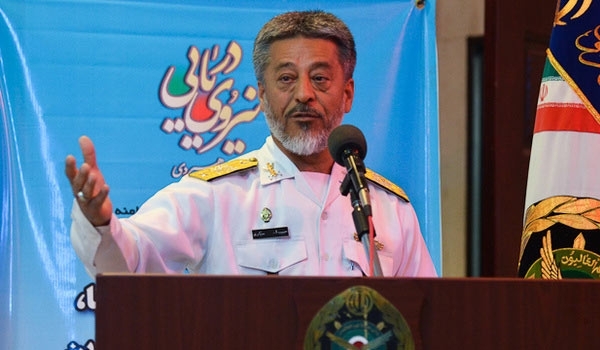Navy Commander Rear Admiral Habibollah Sayyari said Iran’s warships have been equipped with state-of-the-art technologies, adding that the home-made destroyer, ’Damavand’, will join the country’s Caspian fleet in March.
 Navy Commander Rear Admiral Habibollah Sayyari said Iran's warships have been equipped with state-of-the-art technologies, adding that the home-made destroyer, 'Damavand', will join the country's Caspian fleet in March.
Navy Commander Rear Admiral Habibollah Sayyari said Iran's warships have been equipped with state-of-the-art technologies, adding that the home-made destroyer, 'Damavand', will join the country's Caspian fleet in March.
"Iranian warships have been equipped with the most advanced technologies," Sayyari told Fars News Agency on Tuesday.
Referring to the launch of Iran's home-made Jamaran destroyer in the Southern waters 5 years ago, he said the new generation of the destroyer, Damavand, "will join the naval fleet in the Caspian Sea on March 6 in a ceremony in the presence of high-ranking Iranian officials".
Sayyari had informed in November that Damavand enjoys more capabilities than the first home-made destroyer, 'Jamaran'.
"The destroyer will be stronger than Jamaran in terms of defensive systems, range and operational range, radar systems, weapons, electronic warfare and communication systems," Sayyari told reporters in Tehran in November.
He, meanwhile, announced that the same advanced systems would be mounted on Jamaran too.
Iran's first home-made destroyer, Jamaran, was launched in late February 2010.
The Mowdge Class vessel has a displacement of around 14,000 tons and is equipped with modern radars and electronic warfare capabilities and is armed with a variety of anti-ship, surface-to-surface and surface-to-air missiles.
In September, the Iranian Navy announced plans to launch Damavand in the Caspian Sea.
"Damavand will soon join Iran's naval fleet in the Caspian Sea," the Navy's top commander in Northern Iran Admiral Khordad Hakimi told reporters.
"We have no security problem in the Caspian Sea today," he added, but reiterated that "the Navy is fully prepared to confront any threat".
In recent years, Iran has made great achievements in its defense sector and attained self-sufficiency in producing essential military equipment and systems.
Iranian officials have always stressed that the country's military and arms programs serve defensive purposes and should not be perceived as a threat to any other country.
Iran's naval power has even been acknowledged by foes. In a Sep. 11, 2008 report, the Washington Institute for the Near East Policy said that in the two decades since the Iraqi imposed war on Iran, the Islamic Republic has excelled in naval capabilities and is able to wage unique asymmetric warfare against larger naval forces.
Since November 2008, the Iranian Navy has conducted anti-piracy missions in the Gulf of Aden and Bab el-Mendeb Strait to protect the country's cargo ships and oil tankers against pirates.